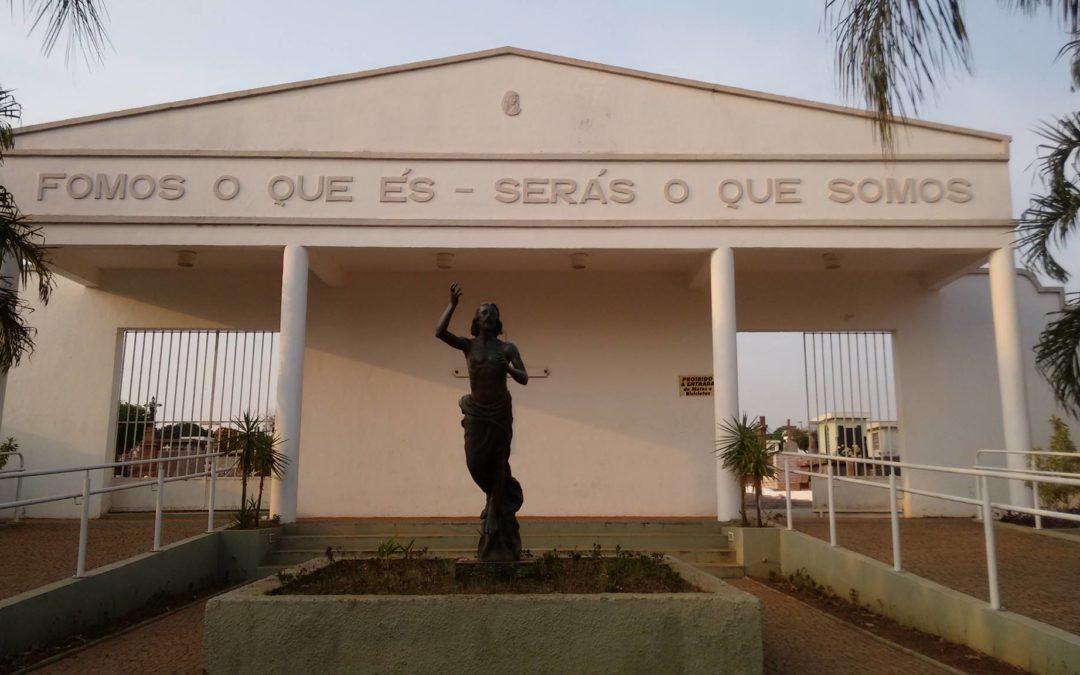Situated in the Magic Realism genre, I wrote this short story in 1999. It was inspired by the foreboding inscription over the entrance to a gated cemetery in Catanduva, Brazil, the town in which I lived as an exchange student in 1990-1991.
FOMOS O QUE ÉS – SERÁS O QUE SOMOS
We were what you are – you will be what we are
The first time I met Giovanna Junqueira de Campos, she was thirty-nine and I was nineteen-years-old. She taught students English in her home and I was living in her small city of Catanduva, Brazil, as an exchange student. She contacted me through the family with whom I was living, asking to meet with me to practice her English.
When I arrived at her home a week later, I discovered that she, like her German-style house, was different from the other Brazilians I had met. An aura of destiny radiated from her brilliant blue eyes, as if she was willed to act by an intuition wiser than her conscious self and that following that will had brought her serenity.
I felt instantly drawn to her and we spent the afternoon talking like old friends. She invited me to spend the next weekend with her and I accepted.
When I arrived on Saturday morning she took me by the hand and led me into the conservative living room saying that she had been anticipating the pleasure of introducing me. To whom, I did not know; she had not mentioned another guest beforehand. But the man who stood and walked toward us, when we entered the room, immediately struck me as significant. She introduced him as her son.
The first thing I thought was “she must have been very young when she conceived him” and the second was “they do not resemble one another in the least”. After that, I stopped thinking, as large, thickly lashed black eyes stared into my own and I absorbed dark suntanned skin and a sensuous smile.
It was love at first sight, or so I thought then, and although I spent much time at Giovanna Junqueira de Campos’ home after that, regrettably, I spent little of it with her. In hindsight, I wish that I had not allowed my ties with Giovanna to remain aloof; perhaps then she would have told me her story herself instead of my hearing it from her son, thirty-four years later as we stood in the cemetery, under the heat of the scorching noon sun.
One day, a woman with wide black eyes and brown, wrinkled skin entered into this cemetery, under the heat of the same scorching sun. She walked through an arch engraved with the words “Fomos o que és – Serás o que somos” (“We were what you are – You shall be what we are”). She went around a maze of ornate statues and placed a wilted bunch of flowers at her husband’s grave. Then she continued to stroll between the markers, absently reading the epitaphs. Her foot slipped, her ankle turned and she slid down through the caked dirt and into an ancient grave that had opened under her weight. She died there, conveniently buried with another forgotten personage, lying close enough to her husband to feel comfortable.
That same day, the fifth day in Giovanna Junqueira de Campos’ eighteenth year, Giovanna left the house of a friend for the bus station just as night was replacing the day. She walked by the cemetery, silent as always, the gate closed now to keep the dead inside its walls. The heat of the afternoon had dissolved into tantalizing clearness, pushed along by a soft breeze scented with eucalyptus.
Past the cemetery, the outside walls of houses met the uneven sidewalk, their pastel-painted faces altered by the glow of the now-visible moon. Through the gap of the still-open metal shutters, Giovanna peered modestly into the private worlds of the families living inside the houses. Through one window, the pock-marked face of a man reflected the flickering light from a television that she could not see. The voices of two Brazilian soap opera stars stirred her senses as she passed the window within touching distance of the man. He pretended not to notice her; she looked in the opposite direction.
She passed a vacant lot, contained on three sides by the walls of other houses. A small wooden cart sat in the middle of the lot, guarded by a decrepit horse. The animal paused from nibbling at the long grass to watch her pass, disregarding the etiquette of ignoring passersby. Giovanna crossed the street.
On the other side, one house stood apart from the others. It was two-storied, German-style with geranium-filled window boxes and a small wooden balcony. Instead of a low wall, the house was separated from the street by a high fence of vertical iron bars with a latched gate. Through the bars, light escaped from an ajar wooden front door intricately carved in an ever-flowing elliptical pattern like bubbles rising to the surface of a stream.
Giovanna slowed her pace to study the house as a tiny boy in white underwear and a stained, sleeveless undershirt appeared from around the impressive door. Wide black eyes peered at her from his brown, somehow wrinkled face. She smiled hesitantly and stopped in front of the gate. A tiny hand materialized from the shadows and beckoned her to come closer. She shook her head but the child’s lips said “come, come inside”. She gingerly tested the gate and it swung open silently.
Inside the big door, the child slipped his hand into her palm and guided her through a staid living room and into a large kitchen that opened onto a covered patio.
“I am with hunger,” the child said.
She went to the refrigerator, opened the door and peered inside. There was a pot of cooked polished rice and one of stewed brown beans and a jar of palm hearts.
While the beans and rice heated on the gas stove, she wandered across the patio into the dark garden in search of ripe fruit and returned with oranges and avocados. She found plates and spoons and set the small Armorite table in the centre of the room with two place settings. The boy sat at the table contentedly. Together, they ate the beans and rice with relish and scooped out halved avocado filled with honey for dessert.
“I am with sleep,” the child said.
Giovanna followed him back through the living room and up an open stone staircase. She ran his bath in a high-clawed tub in the center of a tiled bathroom and searched for a room in which to sleep while he washed. When he was clean, they said their prayers together kneeling in front of his narrow bed. He fell asleep immediately. She bathed and went to bed.
The next morning, Giovanna awoke to the child’s whisper and they descended to get breakfast. The house felt approachable and comfortable in the morning light. She asked the child his name.
He looked up at her seriously and said “Paulinho”—little Paulo—and she smiled again.
“What shall I call you?” he asked.
“My name. Giovanna Junqueira de Campos,” she answered.
“I am without a mother and father,” the child said. “I will call you mãe,”—mother.
Then they walked out into their garden together.
I studied Paulo’s wrinkled face and wide black eyes and asked if he did not think their story exceedingly strange.
“No stranger than everyday existence,” Paulo answered.
We walked through a maze of ornate statues and placed three wilted bunches of flowers at the three graves. Then we continued to wander between the markers, absently reading the epitaphs. We left the cemetery through an arch engraved with the words “We were what you are – You shall be what we are” and strolled home to the shade of our garden.

